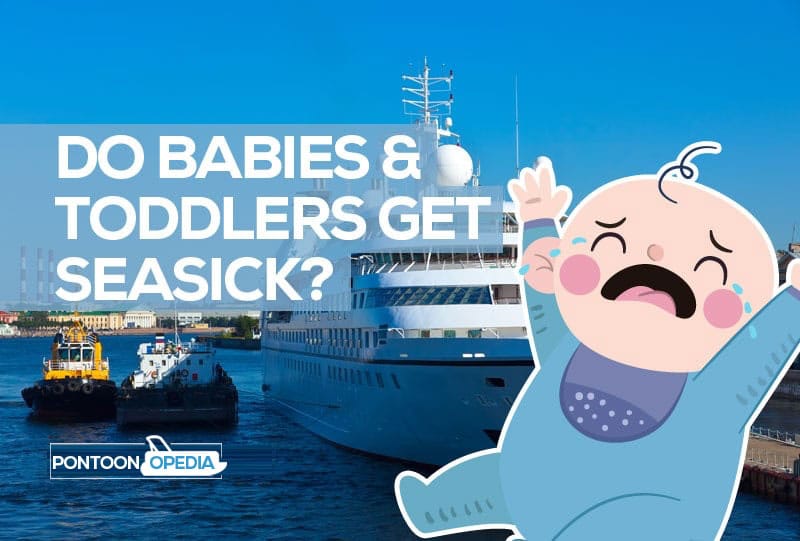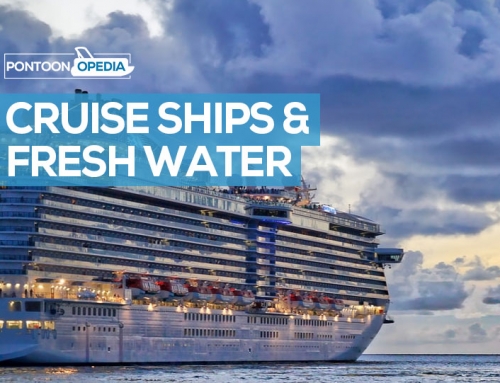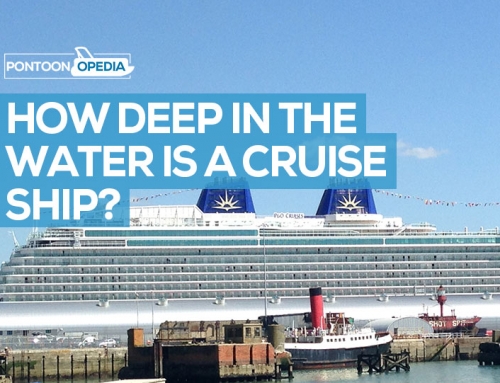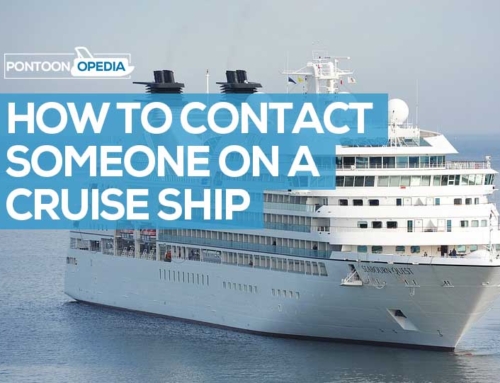Whether you’re just about to embark on a cruise with your baby or are going to be taking your newborn or toddler on a boat, a concern you might have could be seasickness in infants. If you want to know if babies get seasick then the short answer is below. That’s then followed further down by some more detail and ways in which you can prevent it in toddlers and younger kids.
Babies, young toddlers, and children under 2 years old do not typically get sea sickness. However, sea sickness is more common in kids who are under 15 than in adults, with susceptibility starting at ages 6 to 7 years old, with the peak being around 9 and 10 years old.
The answer above is in part taken from a medical journal which I will reference in more detail further down this guide, but I also wanted to give you my own views on things.
To date my wife and I have been on two cruises with our youngest son when he was of baby and toddler ages. We also own a pontoon boat and all our kids have grown up boating and being comfortable on the sea, lakes, and rivers.
A cruise ship will be the largest boat your baby will ever get to go on. The size of the boat is a massive factor with seasickness, and with cruise ships and larger boats, the large size negates a lot of the motion that tends to make people feel ill.
However, it’s a completely different matter on smaller leisure boats though (such as pontoons), as they will get pushed around a lot more on the water, meaning motion sickness is much more common.
That’s not to say your baby won’t get seasick. It still can happen, but I think with a very young child under two years old, it’s unlikely to occur.
Why though?
I have my own theory on this, but also spoke to our doctor and this she had to say:
“Babies are more resilient to seasickness. Way more than adults are. They have a low center of gravity, and for pre-walkers and toddlers who have very poor balance skills they are constantly wobbling anyway so tend to be very used to motion.”
I also researched online and found this quote below in a medical journal (read source).
“Babies and young children under 2 do not usually get motion sickness. However, motion sickness is more common in children under 15 than in adults, perhaps because of habituation. That is, reduction in symptom severity with repeated exposure. It is also more commonly reported in women than in men, although a number of potentially confounding variables related to social roles may account for this observation.”
As I mentioned, our youngest son has been on boats since he was a baby, and in fact we’ve taken him on two cruises at a very young age – you can see a photo of him with my niece Tasha below when we took a cruise out of the UK whilst on vacation.
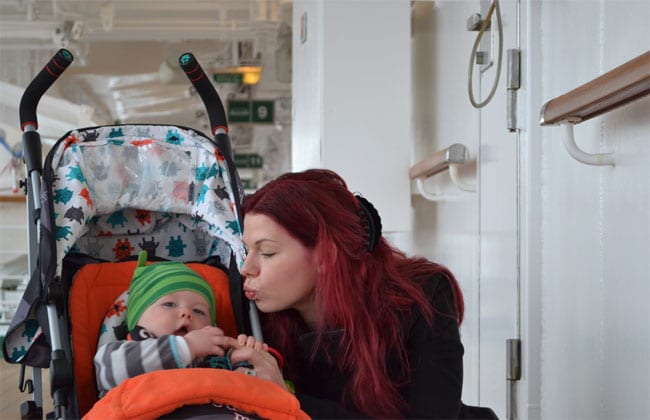
My niece and youngest baby son when we took a cruise ship vacation.
Table of Contents
Do Toddlers Get Seasick?
None of our kids have ever had seasickness problems either pre or post-walking, even in rough water when we’ve taken our pontoon boat out.
My view on it is that infants are used to being wobbly anyway, so most of their early life probably feels like they are on a boat!
And in fact, my youngest children have always slept really well on boats, which is probably due to the rocking motion which they found soothing.
If you think about how kids play as well, especially the younger ones, they love going on merry go rounds, spinning in circles and such like. Not like us adults!
I also believe that there could also be some psychological factors at play.
Toddlers and younger kids don’t actually know that seasickness is a thing. So perhaps their mind hasn’t been trained to think it’s going to be a problem?
When we first started boating, my wife would always get seasick, but mastered it after a few months of being with me. She managed to get over the psychological hurdle of seasickness, which is something I don’t think kids are afflicted with in the main.
That’s just a personal opinion though, but I wouldn’t be surprised if there was some element on truth in it.
But what happens if your toddler, infant, or babies do get seasick on a cruise ship or boat?
Here’s some advice on preventative methods and strategies that can help to stop it happening or make them feel better once they do get ill.
Why Does My Toddler Get Sick When Riding on Our Boat?
It’s motion sickness, or to be more specific, seasickness.
Seasickness is most common in children aged two to ten years old, with some children being more susceptible than others.
As your child gets older, they should grow out of it.
What Causes Sea Sickness in Infants?
It’s caused by repeated up and down movements in the boat.
When that happens, the child’s inner ear will send a different signal to their brain from what they are actually seeing with their eyes.
This confusion in brain, eye, and ear signals makes the child feel unwell.
In a real-world example, let’s say your toddler is looking at a book in a moving boat. In this example his or her eyes will be fixed on the book and will be sending brain signals that they are not moving.
However, other parts of their body will be sending a different message as the boat moves up and down, and these mixed messages will lead to nausea.
How to Prevent Babies & Toddlers Getting Seasick
There are various ways in which you can prevent babies and toddlers from becoming seasick, some of which are preventative, and some of which can be administered whilst they feel unwell.
I am not a massive fan of giving unnecessary medicines to children unless it’s 100% necessary so first let’s look at some advice for non-medicinal remedies that I found on the UK NHS website.
- Do try to minimize motion and have the child sit in the middle of the boat.
- Do get them looking straight ahead and if possible at a fixed point like the horizon.
- Do try to get them to focus on breathing slowly with their eyes closed.
- Do distract them by talking, singing songs, or listening to music.
- Do get them to drink plenty of water and keep hydrated.
- Don’t let them read books, watch movies, or use electronic devices.
- Don’t let them look at moving objects such as rolling waves.
- Don’t let them eat heavy meals before or during the boat or cruise trip.
How to Ease Sea Sickness in Infants
Be patient with them.
It’s bound to be scary, especially if they start to vomit as they won’t have any idea on why they are sick and what’s wrong with them – they will be very confused and frightened.
The signs to look out for when seasickness is coming tends to be a loss of appetite and cold sweats. This will typically be the precursor before they start vomiting if they have very bad seasickness.
Get them in cool air and if possible out on the deck of the boat or ship, sit with them, and place a cold flannel on their forehead.
Handy Hint: I recently wrote a new article about whether or not seasickness can kill you. Read that if you are worried about the fatal implications of nausea when on a boat.
In smaller boats make sure that they are focused on a fixed spot on the horizon. If on a large boat such as a cruise ship and you can’t get to deck, have them focus on something like a cuddly toy on a bed.
The best place to be will be on the upper deck of a large boat, or in the middle of a smaller boat as this will reduce the motion sickness, with results hopefully coming inside of 15 minutes.
Distraction is a great way to also help, but don’t distract them with an iPad, phone, or TV. The best distraction method will be talking, singing, or listening to music.
By taking the steps above, it should help to fix the mixed signals that are being sent from their ears and eyes to their brain.
Handy Hint: When we introduced our younger kids at toddler age to boating, we tried to schedule our initial trips around their nap times. If they are asleep the chances are your infant or baby won’t get seasick.
If your baby or toddler has been sick, then it’s important to keep them well-hydrated to replace the fluids they will have lost.
Other options you could try are motion-sickness bracelets (also known as sea bands), or anti-nausea medication, both of which you can read more about below.
What Can I Give My Toddler for Motion Sickness?
We don’t medicate our children unless it’s 100% necessary, as there are risks associated in giving young infants medicines such as Benadryl. There have been reported cases of overdoses, and that scares me, especially if I am out on a boat in the middle of the sea.
One thing you could consider trying, and in fact we’ve used them with our kids are things called sea bands.
We used to put them on our younger kids the week before we cruised or went on long boating vacations, and then they wear them throughout the entire boat trip.
The result: zero seasickness.
It could have been pure chance and completely un-related. We don’t know for 100% certainty.
How Does a Sea Band Work?
They are thought to prevent nausea by stimulating small pressure points on the child’s wrist. Whilst I can’t find any scientific proof to back up the claim that they work, I can only go on our success in using them.
You can buy them on Amazon, and here’s what the manufacturer states about how they work:
“Sea bands provide effective and natural nausea relief through acupressure. The sea bands provide a drug-free solution, are washable, and don’t have any side effects.”
Can Babies & Toddlers Take Sea Sickness Tablets?
Yes, they can, but always seek advice from a pharmacist or doctor before doing so, and completely exhaust all non-medicinal options before doing so – well that’s my view anyway.
When I spoke to our local pharmacist about this, he told me that for an 8-month year old it would be way better to use a product such as a sea band rather than any drugs. And I completely agree.
There are certain medicines such as Dramamine that 2-year olds and over can take, but what I’ve discovered is that most sea-sickness tablets and medicines are simply anti-histamines.
But medicines like Benadryl should not be administered to babies and are only suitable for the over twos.
However, it is unlikely that your baby will get seasick, as we’ve already discussed, so it might only be the toddlers ages that you need to deal with.
Benadryl could be an option here, but if you’re on a cruise I would be very, very cautious.
Why?
It’s because I don’t believe that the medical staff on cruise ships are that well-trained in pediatrics, and given possible side-effects of anti-histamines, I would be very wary about doing so.
Can You Give Dramamine to a 2-Year Old?
On one cruise I saw a guy buying a medicine called Dramamine in the ship’s pharmacy specifically for his toddler. I’d not heard of it before, so did a little bit of investigation.
What I discovered is that it’s an over the counter seasickness remedy that is safe to use with children who are 2 years and older.
It’s an antihistamine and helps to prevent the symptoms of motion sickness including vomiting, nausea, and dizziness.
Here’s what they say about it on the Healthline website:
“You can give Dramamine to children ages 2 years and older. If your child is younger than 2 years of age, you should get approval from your child’s doctor before giving your child Dramamine. No matter the age of your child, it’s a good idea to check with their doctor before giving them this drug.”
There will be some side effects though, and these can include:
- drowsiness
- dry mouth
- blurry vision
- thickened mucus in their airways
- feeling excited or restless
- increased heart rate
What Other Parents Say
We also asked on the topic of “do babies get seasick” and “how to prevent sea sickness in toddlers” on various Facebook groups we’re in. Here’s a selection of the top comments we received back.
“We were on a on a cruise ship once with our toddler and she got very seasick. We tried the pills, the sea band thing and nothing seemed to work. Then another passenger told us to put a cotton ball into just one ear and plug that ear. We did, and our baby’s motion sickness went away. Don’t ask me how it worked!”
“Our kids get seasick when they aren’t drinking enough water, and our youngest kid gets very unwell if she doesn’t keep hydrated. Be sure you keep them topped up with fluids. It may help you regarding the vertigo.”
“If you get back from a cruise or boat ship and your baby still seems unwell them take them to the doctor to get their inner ear checked. It could be something more serious that requires medical attention.”
Our Final Words
I hope this article and our research has helped you to understand better about whether toddlers get seasick, what you can do to prevent it, and ways in which to make them feel better if seasickness does strike.
Most of you asked the question, do babies get seasick on cruises or boats?
For parents with newborns or babies I want to put your mind at rest.
It’s very unlikely given their age. As they grow older chances are it will happen, but this guide above should give you the help you need to mitigate that as much as possible.
Handy Hint: If you have found this post useful and are considering doing a lot of boat trips with your youngest then I would recommend you take a look at the additional accessories and gear you may need.

